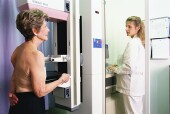- The Best Time of Day to Drink Bone Broth to Maximize Health Benefits
- 8 Ways to Increase Dopamine Naturally
- 7 Best Breads for Maintaining Stable Blood Sugar
- Gelatin vs. Collagen: Which is Best for Skin, Nails, and Joints?
- The Long-Term Effects of Daily Turmeric Supplements on Liver Health
- Could Your Grocery Store Meat Be Causing Recurring UTIs?
- Are You Making This Expensive Thermostat Error This Winter?
- Recognizing the Signs of Hypothyroidism
- 10 Strategies to Overcome Insomnia
- Could Artificial Sweeteners Be Aging the Brain Faster?
Routine Mammograms Found Not Helpful for Most Women Over 70


Mammogram breast cancer screenings for women aged 70 and older may cause more harm than good, according to a large new study.
The screenings don’t decrease the number of advanced breast cancer cases diagnosed in these older women. But the tests can lead to overtreatment in a large number of women and put them at risk from the harmful side effects of breast cancer treatment, the researchers said.
The researchers examined data from the Netherlands, where a mammogram breast cancer screening program was extended in 1998 to include women up to age 75. The study included more than 25,000 women, aged 70 to 75, who were diagnosed with breast cancer between 1995 and 2011.
Among women in this age group, the number of early stage breast cancer cases rose from 260 per 100,000 women in 1995 to 382 per 100,000 women in 2011. There was little change in the number of advanced breast cancer cases, however, which fell from 59 per 100,000 women in 1995 to 53 per 100,000 in 2011.
The findings were presented Friday at the European Breast Cancer Conference in Glasgow, Scotland.
“For a screening program to be effective, one would expect that the incidence of early stage breast cancer would increase while the incidence of advanced stage cancer would decrease because any cancer would have been detected at an earlier stage,” study author Dr. Gerrit-Jan Liefers, a surgical oncologist and head of the geriatric oncology research group at Leiden University Medical Centre in the Netherlands, said in a conference news release.
“However, when we investigated the effect of extending the screening program in the Netherlands from age 69 to 75, we found that it had not led to a decrease in the rate of advanced breast cancers detected, while the number of early stage tumors strongly increased,” Liefers said. “This implies that the effect of screening in elderly women is limited and leads to a large proportion of overdiagnosis.”
The researchers said women aged 70 to 75 were more likely to die from other causes than from any early stage breast tumors detected through mammogram screening. They also said elderly breast cancer patients are at increased risk for complications from surgery and for side effects from treatments such as chemotherapy and hormone therapy.
“Therefore, screening could result in overtreatment and consequently in decreased quality of life and ability to function in older breast cancer patients, without lowering the incidence of advanced stage breast cancer or deaths from the disease,” Liefers said.
A personalized approach should be used when deciding whether an elderly woman should have mammogram screening, the researchers said.
“A prediction tool should be developed in order to estimate which women are at increased risk of breast cancer and should receive breast cancer screening, instead of screening the whole population,” Liefers said.
“For example, an older woman with a long life expectancy who has certain risk factors for developing breast cancer could benefit from breast cancer screening,” he said. “In contrast, an older woman with multiple other diseases or life-limiting conditions, and without any risk factors for breast cancer, will only be at risk of overdiagnosis and overtreatment and may not benefit from screening.”
Because the study was presented at a medical meeting, the findings should be viewed as preliminary until published in a peer-reviewed journal.
More information
The U.S. Centers for Disease Control and Prevention has more about breast cancer screening.
Source: HealthDay
Copyright © 2026 HealthDay. All rights reserved.










